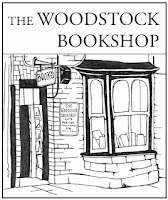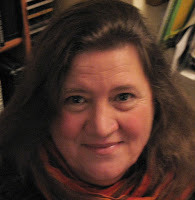***
Susan Price: Having just finished reading Dennis Hamley’s wonderful, subtle
The Hare Trilogy, deciding what to read next will be difficult. My friend Karen Bush has just sent me
Inheritance, a collection of short stories by a Robin Hobb, a writer we both admire. Another friend, Linda Strachan, has sent me her
Guide To Writing for Children, which is a must-read. Visiting my local charity shop resulted in the purchase of Bryson’s
A Walk In The Woods. And I firmly intend to re-read Isabella Tree’s
Wilding, which I found exciting the first time.
***
 Ross Bradshaw of Five Leaves Bookshop, Nottingham:
Ross Bradshaw of Five Leaves Bookshop, Nottingham: Have I read the Australian writer Patrick White before? I can't remember but a customer said I really have to read
Riders in the Chariot (Vintage), which is about four independently damaged and discarded people wandering round the wreckage of a once fine city ... oh dear. But the cover blurb says there is a possibility of redemption. I hope so.
Discourse on Colonialism by Aime Cesaire (Monthly Review) comprises a short essay and material about this essay, first published in 1955 and is our bookshop open book group read in January. We try to vary our reading between fiction and non-fiction, and this came out of our discussion of James Baldwin's
Go Tell It on the Mountain. The bookshop recently put on a talk by Priyamvada Gopal on her
Insurgent Empire (Verso) which was inspirational, as part of an irregular series of events on race and Empire and this is a developing theme among our intellectual and activist customers. It's decades since I read Frantz Fanon and Edward Said but their work seems to be reaching a new generation. I need to revise.
I'm a sucker for Patti Smith so I'm saving her
Year of the Monkey (Bloomsbury) for the two day Christmas break (poor old retailers, eh?). At heart I want to be Patti Smith, sitting in a cafe in New York munching sourdough toast with olive oil dribbled on it, drinking black coffee and rocking out in the evening. I do wear the same cap as she does, which is a start but it's too late to have been a friend of Robert Mapplethorpe and Allen Ginsberg. Here she wanders round the American west coast, writing her short dreamlike essays, illustrated by her usual Polaroid pictures.
***

Wes Magee: In 1975 I traipsed to the Poetry Society HQ in Earls Court, London, and listened to a bespectacled, slight young man talk about his recently published first book. He reported the book’s unheralded emergence, and how ‘traffic continued to flow along the Brompton Road.’ Thus did I discover Ian McEwan’s collection of short stories, First Love, Last Rites, and marvelled at such a confident debut. Since then he has gone on to become a multi-award-winning author, whose novels unfailingly surprise with their virtuosity. I have read the lot, and it is with high anticipation that I look forward to opening his 18th, Machines Like Me, on New Year’s Day, 2020.
***


 Rachel Phipps of The Woodstock Bookshop:
Rachel Phipps of The Woodstock Bookshop: The book I am most looking forward to reading is
Actress by Anne Enright, which comes out at the end of February. I have to come clean and admit I read the proof, but a member of staff has snaffled it and I desperately want to re-read it. She is such a good writer, and this is about an actress and her daughter and their relationship – the daughter’s attempt to reconstruct and understand her mother’s life. I loved it and can’t wait to read it again, which is rare. I have a few days break over Christmas and will take books that I meant to read properly and haven’t –
Ducks, Newburyport by Lucy Ellman, which I have been eyeing in the shop since it first appeared and reading little bits of here and there. It is over a thousand pages which does tend to deter people, but the few pages I have read are enticing. And
A Kitchen in the Corner of the House, a collection of stories by Tamil writer Ambai, beautifully produced by Archipelago Books.
***
Linda Newbery: I've already had one go but am allowing myself a second slot, for non-fiction. These two titles,
Animal Languages and
The Hidden Life of Trees, will complement each other: both look at the lives and communications of non-human creatures, from whale songs and the apparently complex information shared by prairie dogs to the mysteries of the 'wood wide web' by which trees nurture each other and create ecosystems. Both should illuminate how much in the natural world is overlooked by our anthropocentric short-sightedness.
***
Daniel Hahn: Books I’m excited about for the early months of next year? OK, I’ve narrowed it down painfully to, um,
thirteen, some of which I’ve read and some I’m looking forward to. My pair of top tips, though, both of which I have read and mean to read again:
Fernanda Melchor’s
Hurricane Season, translated by Sophie Hughes, is an utterly ferocious piece of storytelling from Mexico; it’s a village story, in part a story of mystery and myth, but told with uncompromising realist brutality and a kind of incandescence from which it’s impossible to look away.
Colum McCann’s
Apeirogon is a novel of Israel and Palestine – it is huge and thrillingly original and political and intimate and perhaps the best book I’ve read this year. But I’m not telling you any more than that. Just order it now.
But oh, there’s so much else besides those two. Also in January/February we have Bae Suah’s
Untold Night and Day, currently next on my TBR; Andrew Krivak’s strange and mesmerising
The Bear (I loved this – a proper read-in-a-couple-of-sittings kind of book); Intan Paramaditha’s
The Wandering, which I have not yet read but which looks intriguingly like a sort of grown-up Choose-Your-Own-Adventure story from Indonesia; and Paul B. Preciado’s bold, provocative and thought-provoking
An Apartment on Uranus. Then through the spring we have the very short and very gripping
Elly, by Maike Wetzel, and many new books by familiar greats: Samanta Schweblin coming in April, and Judith Schlansky, Andrés Neuman and Yuri Herrera in June. June is also when we get David Trueba's
Rolling Fields (I loved this) - oh, and there’s a début by Elaine Feeney to look out for. It's called
As You Were - I’m only fifty pages in and it’s already bursting with emotional power.
***
 ... and finally, an unusual approach from Sally Prue:
... and finally, an unusual approach from Sally Prue: I've just read a library book chosen by a friend (just get anything! I'd said) about Edward VII's mistress Mrs Keppel. It was scattered with dreadful ahistorical generalisations and horrible snobbishness, and I enjoyed it hugely. I have therefore resolved that next year I shall read a) completely random books (I've usually neglected the bottom shelves in the library because of the strain to the knees and eyes) as well as b) as some scorned ones. For instance, I’ve never read
Jeffrey Archer. Can he really be as bad as all that. Can he? I shall find out!















































